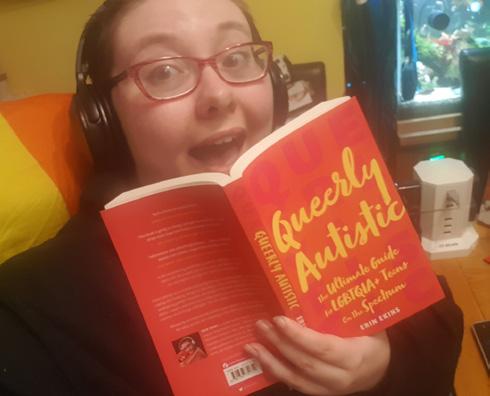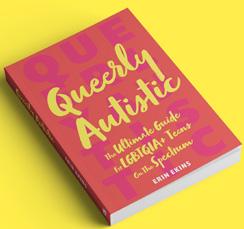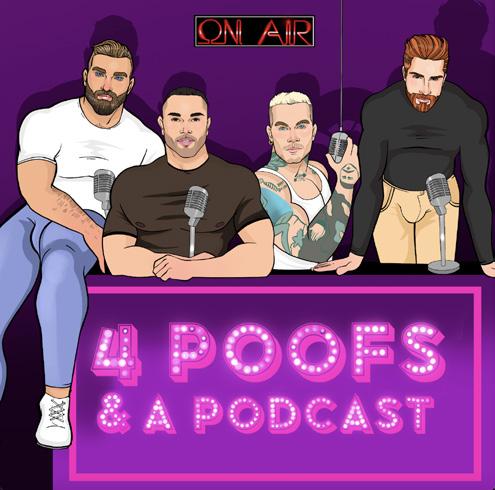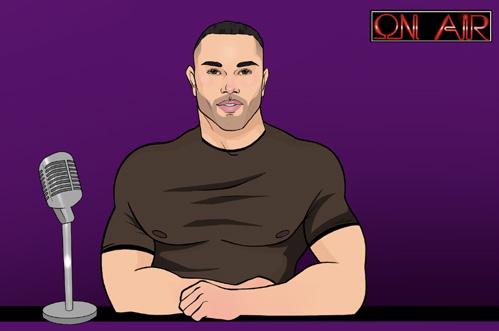
8 minute read
QUEERLY AUTISTIC
about autistic people? “There’s a few. During World Autism Awareness Month in April, lots of people are talking about us and not listening to us. “From my experiences in autistic spaces, a large number of autistic people I know are trans. I think this is held up by research from Tavistock - a disproportionate number of trans people they support were autistic”
Alex Klineberg catches up with Erin Ekins, whose prominence as a queer and autistic commentator has led to a new book, Queerly Autistic: The Ultimate Guide For LGBTQIA+ Teens
Advertisement
) Erin Ekins first found an audience with her blog, Queerly Autistic. She has appeared on The Victoria Derbyshire Show and Radio 5 Live. We started by discussing her book’s intended audience. “It’s aimed at teenagers but I also wanted it to be read by parents of autistic kids. The main question for me is what support did I need as a kid and what information would have helped me and my friends?” Fandom and fan fiction play a big role in Erin’s writing. “It’s where I learnt everything about queerness. I didn’t have access to any sort of queer community where I grew up. I was socially awkward. I didn’t get diagnosed until my early 20s. Fan fiction was a safe space – many queer people are interested in fan fiction.” “It can be hard to come out when you struggle to read people – as so many autistic people do. Coming out is so important. At the same time, I don’t want kids doing it when it isn’t safe to do so”
Each chapter has a Figuring It Out section. How did Erin approach that question? “It was about untangling feelings and having the language to talk about it. As an autistic person, being able to label something is very important. Writing those chapters was hard because figuring it out can be really hard. Brains are strange things and bodies are strange things. Everyone’s journey is unique. I had questions about my sexuality but never really about gender. I relied on other people’s experience for that. Getting into the depths – the nitty gritty – of something is really important to me.” What about the overlap between gender dysphoria and neurodiversity? “From my experiences in autistic spaces, a large number of autistic people I know are trans. I think this is held up by research from Tavistock – a disproportionate number of trans people they support were autistic. There’s a crossover, for sure – why I’m not sure. It’s an interesting question to explore. The idea of gender as a social construct overlaps with the way autistic people experience their gender.” “I’d really like parents to read the book too. It makes so much difference to have supportive parents. Reading and writing this book, I learnt that many people don’t. I did and I’m lucky”
There is a problem though: “With research we get looked at as specimens rather than as people. I want to look at solutions. Less of the ‘why?’ and more ‘how can we help?’.” How does she approach coming out? “I think we see coming out as the big explosion and then it’s done, but that’s not how it works. Coming out is different in terms of who you come out to.”
“It can be hard to come out when you struggle to read people – as so many autistic people do. Coming out is so important. At the same time, I don’t want kids doing it when it isn’t safe to do so. You’re not a coward for not coming out if it’s not safe. You need to have money saved and somewhere to go if you’re unsure. Coming out can be so varied.” What are the biggest misconceptions we have “The biggest misconception is this sense that we’re perpetually infantilised. This is an issue for parents of autistic teenagers. I’ve had backlash for suggesting that your autistic 16-year-old might be struggling with their sexuality. “There was a book a couple of years ago by a self-styled autism mom. Said she’d never be able to see her son in a relationship with a woman without seeing her as paedophile – she can only see her son as a child. This makes autistic people more vulnerable as they don’t get exposed to questions surrounding porn and sexual identity. It plays out when we look at the support available for autistic adults – it’s like we disappear when we turn 18. “There are also misconceptions about our empathy. That we don’t know ourselves. That girls don’t get autism – another big one. It all ties up in this perpetual infantilisation. I think this is why transphobes weaponise trans autistic kids.”
I learnt a lot of things I didn’t know about autism from talking to Erin. Perhaps the best way we can improve our understanding of autism is to talk to autistic people. Reading Erin’s new book might be a good place to start.
In conclusion, Erin said: “I’d really like parents to read the book too. It makes so much difference to have supportive parents. Reading and writing this book, I learnt that many people don’t. I did and I’m lucky. I want to educate parents and empower people to understand themselves. I’m really proud of the book and I hope it has an impact.” ) Queerly Autistic by Erin Ekins is published by Jessica Kingsley Publishers and is available online and at all good bookshops.

HOT GOSSIP

Alex Klineberg catches up with Myles Dobson, one of the hosts of 4 Poofs & A Podcast
) The podcast market is very crowded. Since podcasts became popular in recent years, practically every conceivable topic has been covered. 4 Poofs & A Podcast is one of the newer podcasts and it’s found a sizable and fastgrowing audience. As the name suggests, it’s comprised of four gay men navigating their love lives and life in general. We caught up with Myles Dobson (one of the hosts) to find out more. So, how did the podcast come to fruition? “It was born from a drunken cocktail night while four lonely hearts cried into a Martini glass; the four of us in a flyaway comment while discussing our tragic dating lives wondered ‘Can you imagine if this was a podcast?!’. We soon realised there were no queer podcasts discussing the trials and tribulations and often the complexities of the queer dating scene, let alone making light of it. Never did we think, eight weeks later, 4,000 listeners in our first week and many laughs later would 4 Poofs & A Podcast be born.” “Apps like Grindr and Tinder are so superficial. Everyone has XXL on their profile – everyone is so objectified. What are we going to do? Are we going to be single forever? We discuss everything from gaslighting to ghosting. You dissect them and realise how often these things happen.” “4 Poofs & A Podcast is all about queer life, dating in the modern day, the pitfalls, the laughs and the exploration of our emotional vulnerability. Even though we can all laugh about it now, at one time it did hurt us and affected us on different levels. It’s a beautiful mix of giggles, gags and shade for every beautiful human to enjoy. Think the queer Sex & The City.” They also spotted a gap in the podcast market: “There’s no media format for the queer community with men talking about how we treat each other. We’re also really passionate about issues that affect the LGBTQ+ community. We realise that we aren’t the most diverse range of people. We realise our privilege in that respect. We almost want to use our privilege and explore the way different issues affect people in the queer community.” The world of dating and hook-up apps is quite a minefield, especially in cities with big gay scenes. Grindr offers so much choice and it makes us quite disposable. Why stick to one person when there’s always the next person; maybe even more XXL than the last one? “The queer scene can be a very lonely place, even more so if you’re only just getting to know yourself, let alone others, so as well as entertain in a very relaxed, informal conversation with all the giggles, gags and shade, we want to educate and give those without a voice a voice, or at least let them know they are not alone. As well as the dating catastrophes we also explore key issues that face our community, such as consent, toxic masculinity, sexual discrimination and anxiety & depression. “We’re incredibly passionate about the issues that face our community and we desperately want to open dialogue to frank and honest conversations. We often say ‘You can’t walk a mile in everyone’s heels’, but you can learn about that mile and with open dialogue we can explore everyone’s journey and make the community a better, closer place where we can celebrate everyone’s differences. As part of the weekly schedule over the next year we will be doing special episodes such as Transgender Day of Visibility, George Floyd’s anniversary, Black Lives Matter, Stonewall, the birth of Pride, trailblazers, Martha P Johnson, World AIDS Day and many more. “Nothing’s preachy in what we do. We did an episode called The Queer Commandments: don’t be envious of your friends; don’t shame other people’s tribes… “We’ve had feedback from people from very diverse backgrounds and had a really good response.” ) You can listen to 4 Poofs & A Podcast by visiting https://shows.acast.com/4-poofs











